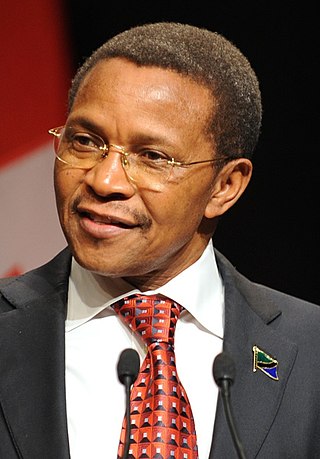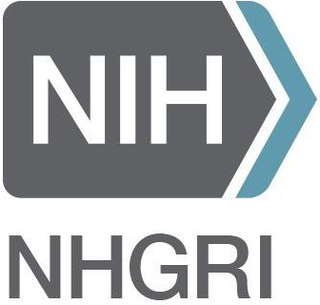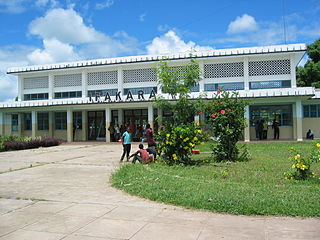
Jakaya Mrisho Kikwete is a Tanzanian politician who was the fourth president of Tanzania, in office from 2005 to 2015.

The National Human Genome Research Institute (NHGRI) is an institute of the National Institutes of Health, located in Bethesda, Maryland.

The University of Dar es Salaam (UDSM) is a public university located in Ubungo District, Dar es Salaam Region, Tanzania. It was established in 1961 as an affiliate college of the University of London. The university became an affiliate of the University of East Africa (UEA) in 1963, shortly after Tanzania gained its independence from the United Kingdom. In 1970, UEA split into three independent universities: Makerere University in Uganda, the University of Nairobi in Kenya, and the University of Dar es Salaam in Tanzania.

Ifakara is a town in the Kilombero District, Morogoro Region, south central Tanzania. It is the headquarters of the Kilombero District administration and the main trading centre for Kilombero and Ulanga districts. The town is located near the Tanzania-Zambia Railway (TAZARA) line, at the edge of the Kilombero Valley, a vast swampland flooded by the mighty Kilombero River.
The Center for Infectious Disease Research and Policy (CIDRAP) is a center within the University of Minnesota that focuses on addressing public health preparedness and emerging infectious disease response. It was founded in 2001 by Dr. Michael Osterholm, in order to "prevent illness and death from infectious diseases through epidemiological research and rapid translation of scientific information into real-world practical applications and solutions". It is not part of the Center for Disease Control or National Institute of Health.
Intermittent preventive therapy or intermittent preventive treatment (IPT) is a public health intervention aimed at treating and preventing malaria episodes in infants (IPTi), children (IPTc), schoolchildren (IPTsc) and pregnant women (IPTp). The intervention builds on two tested malaria control strategies to clear existing parasites and to prevent new infections (prophylaxis).
The following is a timeline of the history of the city of Dar es Salaam, Tanzania.

The St. Francis University College of Health and Allied Sciences (SFUCHAS) is a constituent college of St. Augustine University of Tanzania.

Sarah Cleaveland is a veterinary surgeon and Professor of Comparative Epidemiology at the University of Glasgow.

The Human Development Innovation Fund is a UKAid financed 40 million British Pound challenge fund providing grants to businesses, NGOs and research institutions for scaling innovations focused on the quality, value for money, and sustainability of basic services in education, health and water, sanitation and hygiene (WASH). HDIF was launched on May 12, 2014 with the support of the Vice President of Tanzania.
MSABI is a non-governmental organization founded by Dale Young in 2009 in Ifakara, Tanzania. Its projects focus on water sanitation, hygiene, and education.
Foot odor or bromodosis is a type of body odor that affects the feet of humans.
Caroline King-Okumu is an international development opportunities manager for the UK Centre for Ecology and Hydrology. She was formerly a senior researcher for the International Institute for Environment and Development (IIED). Her major areas of research are dryland ecosystems, economic and environmental assessment, and climate change. She is considered an international expert on land and water management, particularly drylands agriculture. King-Okumu is based in Kenya but is involved in research and projects throughout the world.
Pedro L. Alonso, is a physician, epidemiologist, and researcher in diseases that affect vulnerable populations. Based on a multidisciplinary approach, his work focuses mainly on malaria, although he has also studied other infectious diseases. He served as the Director of the Global Malaria Programme at the World Health Organization between 2014 and 2022, and is currently Professor of Global Health at the Faculty of Medicine and Health Science-Hospital Clinic, at the University of Barcelona.

Rudolf Geigy was a Swiss biologist and a professor of embryology and genetics at the University of Basel. He established the Swiss Tropical and Public Health Institute and studied tropical diseases.

Fredros Okumu is a Kenyan parasitologist and entomologist, who currently works as director of science at the Ifakara Health Institute (IHI) in Tanzania. His primary research interests concern the interactions between humans and mosquitoes.

The Africa Centres for Disease Control and Prevention is a public health agency of the African Union to support the public health initiatives of member states and strengthen the capacity of their health institutions to deal with disease threats. The Africa CDC ideas was proposed by the government of Ethiopia in 2013 during a TB/HIV special summit in Abuja, Nigeria. From 2013 to 2016, the modalities and statue of Africa CDC were developed and the specialized agency was officially launched in January 2017.
Heather Margaret Ferguson FRSE, Professor of Medical Entomology and Disease Ecology, at Glasgow University; a specialist in researching mosquito vectors that spread malaria, in global regions where this is endemic, aiming to manage and control a disease which the World Health Organization estimates killed over 400,000 people in 2020. Ferguson co-chairs the WHO Vector Control Advisory Group and was elected as a Fellow of the Royal Society of Edinburgh in 2021.











